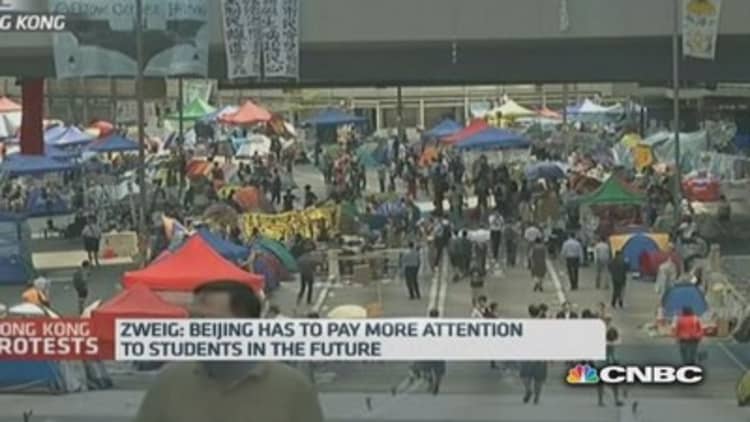As the stand-off between Hong Kong's government and pro-democracy protesters stretched into its third week, analysts warn the civil disobedience movement could cast a 'long shadow' over the city's economic future.
"The short-term damage to the economy is already visible, with retail sales and tourism badly hit. [But] the social discontent and its aftermath are also likely to cast a long shadow over the city's long-term economic potential," Wei Yao, economist at Societe Generale wrote in a note this week.
Around 40 percent of the territory's financial business rides on its "privileged status" as the gateway for international capital seeking to enter or exit China, which could be at risk if the city loses Beijing's favor, she warned.
Read MoreQuantifying the impact of Hong Kong protests
Hong Kong, China's biggest yuan hub, has been the test ground for nearly all new liberalization policies introduced by Beijing including the renminbi qualified foreign institution investors program (R-QFII) – which allows financial institutions to use offshore yuan to invest in the mainland's securities - and the upcoming Shanghai-Hong Kong stock connect that will allow the cross-border trading of stocks between the two cities.
"The reform experience accumulated in the past few years is probably giving mainland policymakers more confidence to diversify the liberalization approach. The cooperation with other international financial hubs is likely to speed up, and Shanghai's free-trade zone experiment will probably regain its momentum" Yao said.

Shanghai's free-trade zone, a 29 square kilometer zone on the outskirts of China's commercial capital, is viewed as a test pad for economic and financial reforms such as currency liberalization, market-determined interest rates and free trade, although progress has been gradual.
Under a scenario of "fast reform" in the mainland, Hong Kong's income per capita would be 7-12 percent higher by 2030 than a "no reform" scenario, with most of the boost coming from financial channels, Yao said, citing IMF calculations. "However, if the mainland opts for less reliance on Hong Kong as a liberalization test ground, this projection will be at risk," she said.
Will HK get cold shoulder treatment?
Louis Kuijs, chief China economist at RBS is less concerned that that Hong Kong's protests will lead to a change in strategy by Beijing with regard to financial liberalization.
"Nothing is impossible, but I would not consider that likely. The impact of the protests on the day-to-day workings of the financial sector is small and I am not sure that the central government would benefit from 'punishing' Hong Kong," Kuijs said.
Read MoreBad idea, Beijing: Crackdown may kill golden goose
Chris Leung, senior economist at DBS agrees Hong Kong will remain an integral part of China's liberalization policies.
The worry is that China could slow the opening of the capital account amid political upheavals, impacting Hong Kong's offshore RMB development, but alternatives to the city – with its distinct advantages in terms of trade flows, geography and institutions – are few and far between, he said.
"While China could consider alternatives on the mainland, that would involve institutional changes and this course therefore remains unlikely," he said.
Nevertheless, there's one sector of the economy that most analysts fear could suffer a longer-term setback: tourism.
"There is a tail risk that mainland tourism to Hong Kong - a pillar of Hong Kong's economy - is affected more permanently, either because of perceptions among the Mainland public or changes in policy," Kuijs said.
Read MoreHow badly will the HK protests hurt tourism?
On October 2, during the week-long Golden Week holidays, the Chinese National Tourism Association issued a travel advisory warning tour groups from going to the territory because of safety concerns.
Immediate impact visible
While the longer-term economic implications of the protests are debatable, there's little doubt growth will take a hit in the short-term.
The protests, which have paralyzed several parts of the Asian financial hub, have begun to pinch segments of the economy, in particular retail and tourism.
This has led several banks to downgrade their growth outlook for the city. Last week, Goldman Sachs cut its fourth quarter gross domestic product forecast to 2 percent from 2.5 percent on expectations of lower tourist spending.


